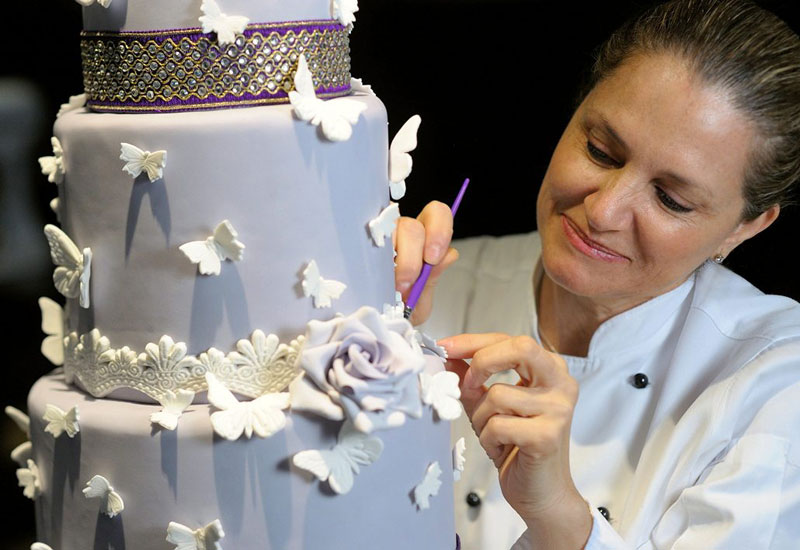Pastries are definitely very popular in the region, with bakeries, pâtisseries, cupcake shops, cake stores and macaroon-focused concepts popping up everywhere, and events like Salon Culinaire at Gulfood showcasing the range of abilities from the region’s pastry experts. We talk to a few industry gurus on what they think about the market right now.
Is the pastry industry in the Middle East a lucrative business?
Magnolia Bakery chief baking officer Bobbie Lloyd says: “Based on the number of requests we get for franchises in the region, I would say yes. Currently, we have three stores in the UAE with two more expected to open in 2015; one store in Qatar, with another opening in 2015; two in Kuwait, with one opening this year, and two in Beirut with a third opening this year.”

| Advertisement |
But it’s not just about stores, it’s also about the culture, which tends towards sweets and pastries. Gelly Kalouta, cake artist, Cakes by La Farine at the JW Marriott Marquis Dubai says: “There will always be a demand for pastry here because of the local custom to bring sweets and cakes as a gift, because of the prevalence of statement cakes at big events, the growing café culture, and interest in nostalgic concepts like afternoon tea.”
But ingredients play a big role in this as well. Kalouta continues: “Pastry in the Middle East is definitely a lucrative business as long as the produce is consistently high quality. With good quality pastry you can build a reputation for excellence and a loyal customer base. In Cakes by La Farine, we have loyal followers, especially big local families, who publicise us through word-of-mouth.”
La Marquise pastry chef and IRCA brand manager Ben Amor adds: “In the Middle East, the pastry business is growing day by day and as a result, pastry professionals and business owners increase their innovation expectations and quality demands.”
Are pastries offered in this region affected by global trends?
We’ve already spoken about trends, but it’s an obvious question: how do international trends affect the local market? For example, after the rise of the cronut, we saw many pâtisseries in the UAE spring up with their own versions. Four Seasons Resort Dubai at Jumeirah Beach executive pastry chef David Peduzzi explains that when it comes to the pastry world, the local market is still behind Europe, some Asian cities and the US. He adds: “The Pastry World Cup is a good reference for established or emerging countries in that area.”
And with a well-travelled customer and chef base, it’s only natural that international experiences affect what is demanded and created locally. Kalouta says: “This region is affected by the global trends, as more locals travel the world to witness new innovations that they also then want to experience in their own city. All of the most recognised pastry brands now have a presence in the region, like Ladurée and Angelina Tea Room.”
Amor agrees and says the Gulf region has definitely been influenced by several global trends. He cites the growing demand for healthy pastry products. “Customers are seeking healthier options which include low-fat and/or gluten-free pastry products.”
Sofitel The Palm Dubai executive chef Olivier Chaleil has a different take on international vs global, and says there has been a shift in the sourcing of food and using more organic and local produce. He says: “I personally try to source and use only local products from close proximity. I have also encouraged our international suppliers to consider opening factories in Dubai.”
What training is essential for handling pastry work?
Pastries are an intricate craft, one often likened to architecture. Chaleil says experience is essential. “It is also very important to understand the difference between pastry and cooking — you are following a recipe for both. However, scaling and weighing ingredients is very important for pastry, while creativity is required for cooking recipes to enhance flavours and taste. It is also important to have knowledge of the products available for pastry work, such as special sugars and machinery for processing.”
Kalouta stresses that essential training is required to understand ingredients, their quality and how best to prepare them. Additionally, she says, it is important to have proper hygiene training.
Lloyd, however, explains that it depends on the type of pastries being offered. “At Magnolia Bakery, we can train a baker without a pastry degree or certification to make the most of what we offer, as our recipes are classic American style. Cake icing and special decorative work requires a more highly trained and skilled pastry chef,” she says.
Technology versus traditional methods in pastry?
There is a fine balance between technology and traditional methods of cooking, and the same applies to pastry work. Lloyd says: “Again, it depends on the type of pastries. But all baking is based on the fundamentals of cooking. Having a full knowledge of ingredients and techniques will allow any pastry chef to be creative and interchange products to come up with something unique.”
Kalouta agrees: “Technology is making great advances; we have printers that can print edible colours, which is great for creating logos on icing paper. I also use an app called ‘Tiered Caker’ which enables me to calculate construction dimensions, amount of slices it will yield, and cost per piece.”
Chaleil adds: “It requires a bit of both — you cannot make a traditional bread recipe from 200 years back and expect to make profit. Everything was done by hand, nowadays we have machinery available for mass production.”
Peduzzi concludes: “Technology adds tools to explore our creativity, challenge our limits and facilitate our daily tasks. It also helps us to be more efficient but will never replace the traditional methods as those remain the foundation.”









 Search our database of more than 2,700 industry companies
Search our database of more than 2,700 industry companies









